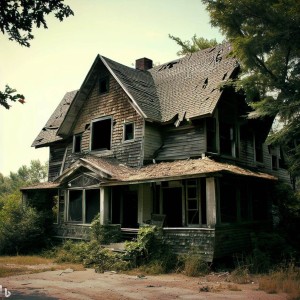Exploring the Symbolism of Seeing Yourself in Your Former House in the Dream

Dreams of revisiting your past homes can be a vivid and emotional experience. Recurring dreams of seeing yourself in your former house may hold deeper meaning and symbolism. Exploring the significance of these dreams can provide insight into one’s past, present, and future selves.
I. Introduction
A. Exploring the Meaning Behind Revisiting Past Homes in Dreams
Do you ever dream of revisiting a former home, only to wake up feeling nostalgic or even emotional? Many people experience dreams like this, where they wander through a familiar place they used to call home. Whether it’s a childhood home, a first apartment, or a previous residence, these dreams can be powerful and vivid experiences. This article will explore the deeper meaning behind these dreams and the significance of seeing yourself in your former house in the dream.
B. The Emotional Impact of Revisiting Past Homes in Dreams
Revisiting a former home in a dream can bring up a range of emotions. On the one hand, it can be a pleasant trip down memory lane, reminding you of happy moments from the past. On the other hand, it can be a challenging experience that brings up feelings of loss, regret, or sadness. These emotions can be particularly intense if the house is associated with a significant event or period, such as a childhood home or a place where you once lived with a loved one.
C. Significance and Symbolism of Recurring Dreams
Recurring dreams of seeing yourself in your former house can hold important symbolic meaning. Our dreams often reflect our subconscious thoughts, feelings, and experiences. As such, these dreams may indicate unresolved issues or emotions from our past that we need to address to move forward. They may also remind us of the different life stages and transitions and how these experiences have shaped us into who we are today. In the following sections, we will explore these themes in more depth and provide tips for interpreting dreams of former homes.
II. Understanding the Subconscious
A. Dreams as a Reflection of the Subconscious Mind
Dreams are a window into our subconscious mind, revealing thoughts, feelings, and desires that may be hidden from our conscious awareness. They provide a unique opportunity to explore and process aspects of ourselves that we may need to be fully aware of. Revisiting a former home in a dream can be a way of processing and integrating past experiences and emotions.
B. The Role of Memory in Dreams
Memory plays an important role in dreams, providing the material for our subconscious to work with. The mind uses memories to construct dreams, weaving various images, emotions, and sensory experiences into a coherent narrative. Dreams of former homes are often filled with positive and negative memories that are being processed and explored.
C. Processing Past Experiences through Dreams
Dreams can also be a way of processing and making sense of past experiences. They may provide a different perspective on events or emotions, allowing us to understand ourselves and our past better. Dreams of former homes may be particularly significant, representing a specific time and place.
III. Interpreting Dreams of Former Homes
A. Recognizing Common Themes and Symbols
Interpreting dreams of former homes involves recognizing common themes and symbols that are often present. For example, a dream of a childhood home may represent nostalgia or a desire to return to simpler times. A dream of a previous residence may represent a desire for change or a longing for a new beginning. By identifying these themes and symbols, we can unravel the deeper meaning behind our dreams.
B. Understanding the Significance of Different Rooms
The different rooms of a former home may also hold important symbolic meaning. For example, a dream of a bedroom may represent intimacy or personal relationships, while a dream of a kitchen may represent nourishment or emotional sustenance. By paying attention to the specific rooms in our dreams, we can better understand the areas of our lives that may need attention or healing.
C. Identifying Patterns and Recurring Dreams
Recurring dreams of former homes may indicate a particular issue or emotion that needs to be addressed. By identifying patterns in our dreams, we can see the connections between different aspects of our lives and gain insight into what may be holding us back. Keeping a dream journal can be a helpful tool for identifying these patterns and exploring their significance.
IV. Psychological Interpretations
A. Connection to Childhood and Family Dynamics
Dreams of former homes can be particularly significant when they involve childhood homes or memories. They may indicate unresolved issues or emotions related to family dynamics, relationships, or childhood experiences. By exploring these dreams through a psychological lens, we can understand how past experiences may impact our present behaviors and beliefs.
B. Representations of Identity and Self-Image
Dreams of former homes may also indicate how we see ourselves and our place in the world. For example, a dream of a large and luxurious home may represent feelings of confidence and success. In contrast, a dream of a run-down or dilapidated home may represent feelings of insecurity or self-doubt. By exploring these dreams in the context of our self-image, we can better understand our beliefs about ourselves and our potential.
C. Exploring Feelings of Nostalgia and Loss
Dreams of former homes can also be a way of processing feelings of nostalgia and loss. They may represent a longing for a simpler time or a desire to reconnect with our past selves. By exploring these feelings through our dreams, we can gain insight into what we may be missing in our current lives and how we can work to create a sense of meaning and fulfillment.
V. Spiritual and Cultural Interpretations
A. Symbolism in Different Cultures and Traditions
Dreams of former homes may have different symbolic meanings depending on the cultural or spiritual context in which they are interpreted. For example, in some cultures, dreams of ancestors or deceased loved ones may be seen as a sign of spiritual connection or guidance. By exploring our dreams’ cultural or spiritual significance, we can understand how our beliefs and values may shape our experiences.
B. Beliefs about the Afterlife and the Spirit World
Dreams of former homes may also be interpreted in the context of beliefs about the afterlife or the spirit world. They may represent a connection to loved ones who have passed on or a message from the universe or a higher power. By exploring these interpretations, we can feel comfortable and connected to something greater than ourselves.
C. Exploring the Connection Between Dreams and Intuition
Dreams of former homes may also be a way of tapping into our intuition or inner wisdom. By exploring these dreams in the context of our intuition, we can gain insight into our deepest desires and needs. We can also use our dreams to set intentions and manifest our goals and aspirations.
FAQs
Q: What does it mean when you dream about seeing yourself in your former house?
A: Dreams of seeing yourself in your former house may hold symbolic meaning related to past experiences, unresolved emotions, or aspects of your identity.
Q: Why do we dream of revisiting past homes?
A: Revisiting past homes in dreams can be a way of processing and integrating past experiences, exploring unresolved emotions, or tapping into our deepest desires and needs.
Q: Can dreams of former homes be interpreted in different ways?
A: Yes, dreams of former homes may have different symbolic meanings depending on the psychological, cultural, or spiritual context in which they are interpreted.
Q: Do recurring dreams of former homes indicate anything significant?
A: Recurring dreams of former homes may indicate a particular issue or emotion that needs to be addressed. Identifying patterns in these dreams can help us gain insight into what may be holding us back.
Q: Can exploring dreams of former homes be a helpful tool for personal growth?
A: Yes, exploring dreams of former homes can be a helpful tool for gaining insight into our past experiences, current beliefs, and future aspirations. It can also provide clarity and direction for personal growth and development.
Q: How can I interpret my dreams of former homes?
A: Interpreting dreams of former homes involves recognizing common themes and symbols, understanding the significance of different rooms, and identifying patterns and recurring dreams. It can also be helpful to explore the psychological, cultural, or spiritual context in which these dreams are interpreted.
Q: Is it important to keep a journal to explore dreams of former homes?
A: Keeping a dream journal can be a helpful tool for exploring dreams of former homes and identifying patterns and recurring themes. It can also provide a record of insights and reflections that can be revisited over time.
Conclusion
Exploring dreams of former homes can be a powerful tool for personal growth and self-discovery. By delving deeper into the symbolic meaning behind these dreams, we can gain insight into our past experiences, current beliefs, and future aspirations. Whether interpreted through a psychological, cultural, or spiritual lens, dreams of former homes can provide clarity and direction for our lives.
Suggested Readings
For those interested in delving deeper into the dreams of former homes, various resources are available. From psychological interpretations to spiritual explorations, these books and websites offer insights and guidance for interpreting and understanding these powerful dreams.
- “Homesick: Why I Live in a Shed” by Catrina Davies
This memoir explores the author’s experience of living in a shed in rural England and the connections between homelessness, housing, and a sense of belonging. With vivid descriptions of her childhood home and her current living situation, Davies provides a unique perspective on the meaning of “home.” - “The House That Made Me: Writers Reflect on the Places and People That Defined Them,” edited by Grant Jarrett
Various authors’ essays explore the connections between physical spaces, memories, and identity. From childhood homes to vacation rentals, the essays in this book provide a diverse range of perspectives on the meaning of “home.” - “The Dream Dictionary from A to Z” by Theresa Cheung
This guidebook interprets over 1,000 common symbols and themes found in dreams. With entries ranging from “abandonment” to “zoo,” this book can be a helpful tool for interpreting dreams of former homes. - “The Interpretation of Dreams” by Sigmund Freud
Considered a classic in the field of psychoanalysis, Freud’s “The Interpretation of Dreams” provides a detailed exploration of the role of dreams in the subconscious mind. While some of his theories may be controversial, Freud’s work can provide a useful framework for interpreting dreams of former homes. - “Dream Moods A-Z Dream Dictionary”
This online resource provides a searchable database of common dream symbols and themes. Users can search by keyword or browse by category to explore the meaning of their dreams. - In conclusion, exploring the significance of seeing yourself in your former house in the dream can be a rewarding and enlightening journey. Whether you approach these dreams through a psychological, cultural, or spiritual lens, many resources are available to help you gain deeper insights into the meanings behind these powerful dreams.






